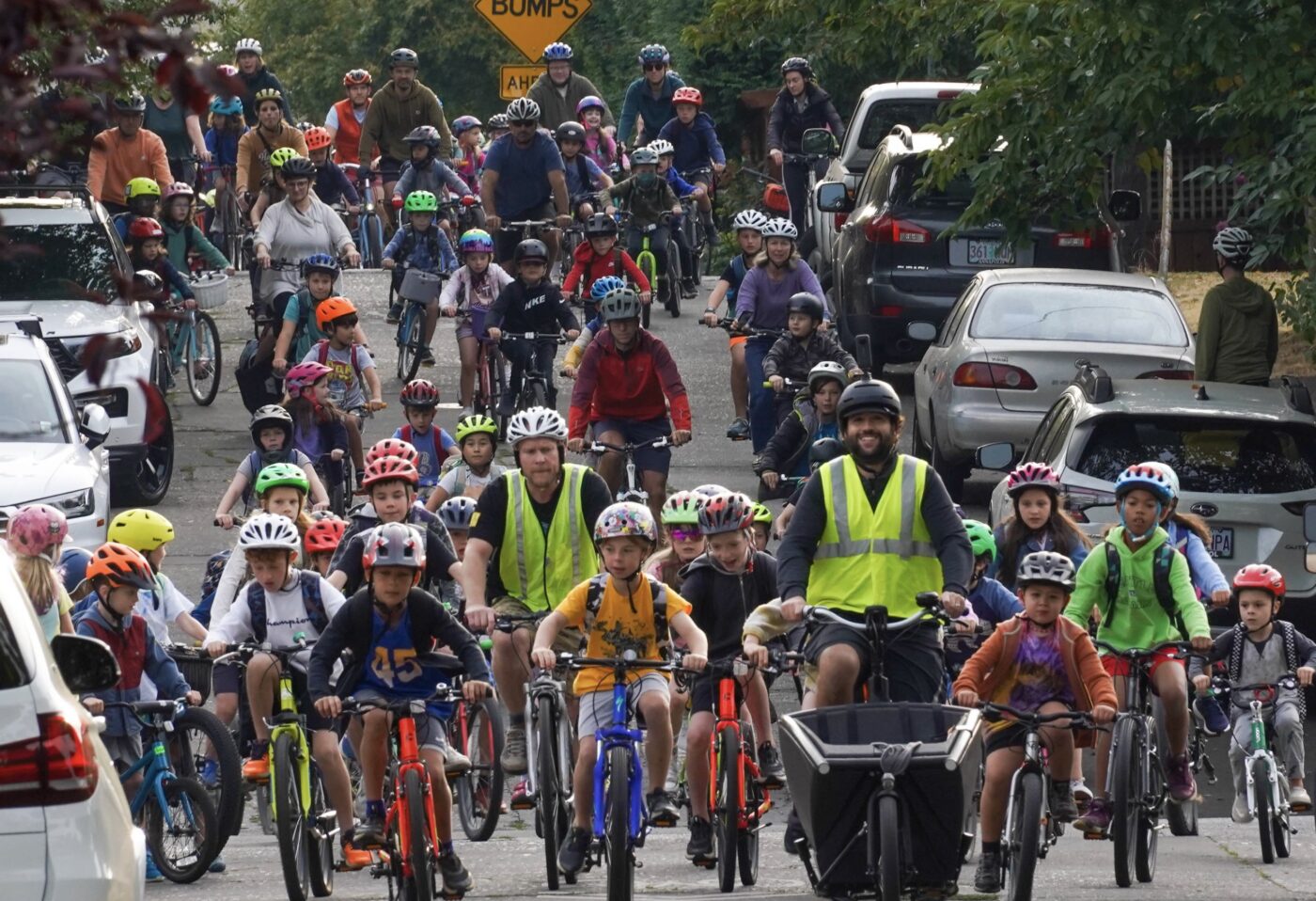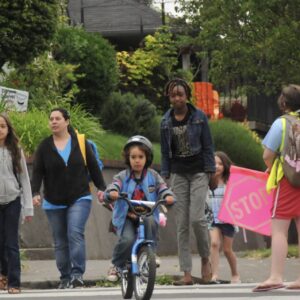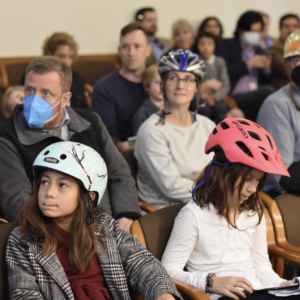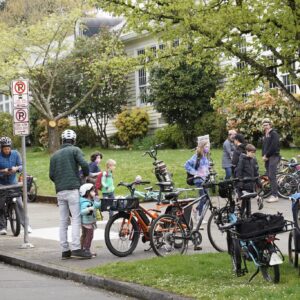The “Bike Bus Bill” pedaled forward at the Capitol in Salem this morning, climbing another hill on its way to becoming law. And despite it’s very slim chances for passage due to the ongoing Senate Republican walkout, the groundwork laid on this bill should bode very well for future sessions.
House Bill 3014 would give schools more flexibility in how they spend transportation funds. Schools with an alternative transportation plan approved by the Department of Education would receive a waiver to implement it and be reimbursed out of the state school fund to pay for it. Currently almost all school transportation funds go toward yellow school buses; but not everyone is served by one of those routes and there are many families who need financial support to walk, take public transit, or bike to school.
HB 3014 has been dubbed the “bike bus bill” because it would allow schools to pay people to organize and lead them. Bike buses have skyrocketed in popularity throughout Portland (and beyond) as a safe and fun way for kids to get to school; but unlike school buses, the state does not offer funding for them or other activities like walking school buses or crossing guards.
While the bill has enjoyed strong support from lawmakers and transportation advocates statewide, it has also faced opposition from the Oregon School Employees Association (OSEA), a union that represents 22,000 public school workers — including school bus drivers. They worry the bill will shift attention and resources away from school buses and their members who drive them. At a work session for the bill at a meeting of the House Committee on Revenue this morning, the bill’s chief sponsor, Representative Hoa Nguyen, a former attendance coach at Portland Public Schools, explained how she’s made significant compromises in order to get OSEA on board.
“There was a lot I had to balance on this bill,” Nguyen said. “Making sure we stay with the intent of the bill, and at the same time working with OSEA and getting them to neutral.”
The key changes to the version of the bill that passed today respond directly to OSEA’s concerns.
The bill applies the definition of “active transportation” to students who use human-powered forms of travel and live less than three miles from school. That’s down from five miles away from school in the previous version of the bill, thus reducing the scope of potential active transportation users. Another significant change to the bill is how it defines what type of expenses can be reimbursed as “active transportations costs.”
If passed, schools could be reimbursed for costs associated with a “pedestrian or bicycle group”, a “crossing guard” or, “staff time required for coordinating active transportation options.” The new version of the bill that passed today adds language that prevents schools from using state money to hire parents, contractors, or any, “individual who is not an employee of the school district.”
The latest version of the bill also puts a sunset of two years on any approved alternative transportation plan a school is being reimbursed for.
A compromise with OSEA makes it harder for schools to reimburse families for use of public transit. Earlier versions of the bill provided some protection for school bus drivers by requiring schools to prove that other (non-bus) options were not suitable before approving reimbursements for public transit passes. But the bill that moved forward today went further. In Rep. Nguyen’s words during testimony today, “It puts in guardrails around transit pass reimbursement, seeing that these must be a last resort, used only if districts can demonstrate that they attempt to recruit, hire, train and pay yellow school bus drivers at competitive wages consistent with collective bargaining agreements and were unable to do so.”
And finally, the bill now includes an expanded definition of what should be considered a “suitable and efficient” alternative to school buses for students. This is important because OSEA (or anyone else) could argue that a bike bus or walking school bus isn’t safe and therefore should not be part of a school’s approved alternative transportation plan. The definition now says for something to be considered “suitable and sufficient” it must be “appropriate for a particular student or group of students based on the age of the student; the physical or mental capabilities of the student; the distance the student is to be transported; and the safety of the student to be transported.”
OSEA Government Affairs Specialist Susan Allen testified today that her group is no longer opposed to HB 3014. “It strikes the critical balance between getting students safely to school, yet being very sympathetic and innovative in terms of how we are getting children to school in a way that is both practicable, addresses the liability, and also has very high fiscal responsibility.”
Revenue Committee member Rep. Pam Marsh (D-Jackson County) said she thinks OSEA got too much out of the deal, but she’ll vote for it anyways. Marsh said she’s a strong believer that kids should be able to bike and take public transit to school. “I think that, frankly, the amendment goes farther than I would prefer in advantaging school buses over public transit. I think kids are fine on public transit. That said, I appreciate the bill and will be an enthusiastic supporter of it.”
Next stop for the bill is a vote on the House floor. After that, it’s likely to become one of the many bills that will die this session due to the Republican walkout.
But Rep. Nguyen can rest somewhat easier knowing that she has opened up a new and very important conversation about school transportation. And the work she did to win OSEA’s favor will help the bill maintain its bipartisan support. If or when the legislature becomes functional again, HB 3014 should have very smooth sailing toward passage.








Thanks for reading.
BikePortland has served this community with independent community journalism since 2005. We rely on subscriptions from readers like you to survive. Your financial support is vital in keeping this valuable resource alive and well.
Please subscribe today to strengthen and expand our work.
Yay !! Crossing my fingers and toes that this will get passed by the legislature and signed by the Governor !
Looks cool. Hope it passes. But unlikely PPS will direct any money to it. My kids go to an elementary school on a very busy street and one kid was hit on his bike last school year and suffered a very significant injury (fortunately now improved) but PPS won’t even pay for crossing guards at the school. Parent and educators who come here from elsewhere are SHOCKED PPS does not provide crossing guards (some schools on less busy streets use student volunteers). Also, as fewer people send their kids to PPS they will have even less $. I’m not holding my breath they will fund any bike bus leaders/organizers in Portland. 🙁
What’s unsaid in this piece is that this bill will die when/if quorom is not met by session end (almost a certainty).
ummm… 2nd to last graf – “…it’s likely to become one of the many bills that will die this session due to the Republican walkout.”
Twitter has rotted everyone’s brain, nobody reads past the headline.